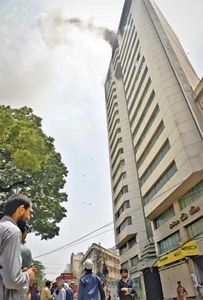KARACHI: City planners, engineers and experts of building plans at a symposium were sure on Wednesday that some 90 per cent of all structures in Karachi — residential, commercial and industrial — did not have fire prevention and firefighting system and agreed that it was ‘a criminal negligence’ on the part of the regulatory bodies like Sindh Building Control Authority (SBCA) that put lives of millions of people in the metropolis at risk.
The experts referred to the data that more than 15,000 people lost their lives and suffered losses of over a trillion rupees every year due to fire accidents across the country which mainly occurred in urban areas where majority of residential, commercial and industrial structures were raised in violation of defined building rules.
The warning regarding challenges of growing fire incidents and their possible prevention and available solutions came at the National Fire Safety Symposium & Risk Based Awards organised by Fire Protection Association of Pakistan (FPAP) at a local hotel.
Experts from across Pakistan presented their papers and shared their experiences and expertises in fire prevention and safety.
Experts say implementing fire safety laws could save thousands of lives
They warned that growing concrete structures without following the defined building code posed serious threats to hundreds of thousands of lives and asked the government to move fast for effective implementation of fire prevention and firefighting laws “before it’s too late”.
The symposium was addressed by Sindh caretaker Minister for Industries, Commerce and Revenue Younus Dagha and caretaker Minister for Sports, Culture and Youth Affairs Dr Junaid Ali Shah and officials from Provincial Disaster Management Authority (PDMA), Rescue 1122 and representatives of corporate sector.
Dominic Ellis, deputy commissioner and operational director for prevention, protection and operational policy of London and Rob Llewellyn of Confederation of Fire Protection Associations - Asia (CFPA-A) also addressed the symposium through video link.
“I heard experts here who referred to the data that 70 per cent of buildings don’t have fire prevention and fighting system,” said Mr Dagha while addressing the symposium.
“I believe that the number might be much higher and it would be something around 90 per cent. But today in this symposium I have brought secretary of industries and MD SITE [Sindh Industrial Trading Estate] just to reflect on our plan. We have a meeting of SITE board next week where we would approve all proposals discussed here today for fire prevention and fighting. There are some 30,000 to 40,000 industrial structures in Sindh and we would start from here in Karachi.”
Dr Junaid Ali Shah said that majority of hospitals and educational institutions did not have firefighting system or emergency fire exit.
“Due to such negligence we see fire incidents cause heavy damages. These fire incidents can be prevented, if the system remains in place,” said Dr Shah.
FAPF president Kunwar Wasim said higher number of fire related tragedies had failed to serve as a wake-up call for regulatory bodies and implementing authorities.
“The Building Code Fire Safety Prevention, which was prepared by the Pakistan Engineering Council in collaboration with the National Disaster Management Authority, was passed in 2016 but even after seven years, we haven’t moved an inch,” he said.
“Not a single clause of this code is implemented in Karachi. It’s so unfortunate that the regulatory body like SBCA doesn’t even bother about fire safety. It neither cooperates with those who want prevention and safety.”
Tariq Moin, director training and projects of FPAP, said most fire protection equipment at buildings were ineffective and only put in place to meet ‘legal formalities’.
“Their refilling doesn’t meet the required standards and no one is there to certify their fitness and test their effectiveness,” he added.
Fawad Barry of Haseen Habib, a fire safety equipment and systems solution provider, said: “Apart from an estimated 15,000 deaths and over a trillion rupees financial losses across Pakistan, some 150,000 suffer burn wounds due to these fire incidents.”
Published in Dawn, November 23rd, 2023













































Dear visitor, the comments section is undergoing an overhaul and will return soon.